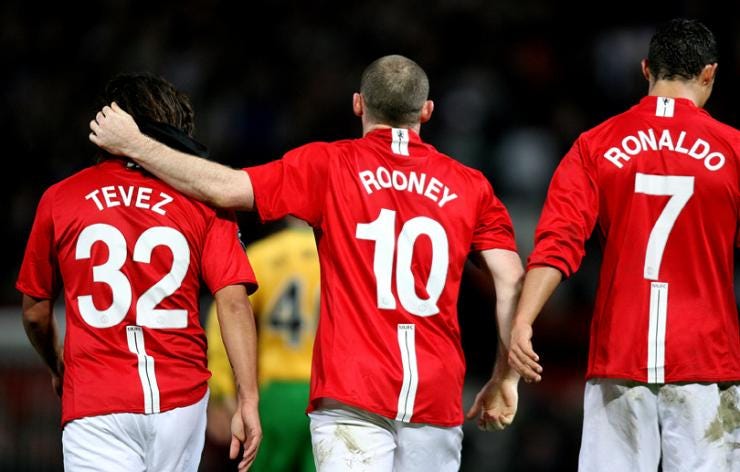The ego-death of Ronaldo and Ibrahimovic is a good thing for football
Two of the planet’s biggest stars are imploding. Maybe for the best…
One of the central tenets of coffee-table Buddhism is the death of the ego: a fundamental psychic shift towards enlightenment from a selfish, solipsistic personal world-view.
Zlatan Ibrahimovic has a back tattoo depicting five Buddha heads; he says they represent “the five elements, water, earth, fire, and so on”. Cristiano Ronaldo recently bought a huge Buddha-head statue for his garden; you can see it in the background of an Instagram snap he posted of his Porsche.
It’s probably fair to say Ibra and CR7 might have to work a bit on their karma. They certainly don’t seem to be subsuming their personal needs for the greater good.
Imploding solar system
We are told that football needs stars, but solar systems tend to end badly. When a star runs out of fuel, it expands violently then contracts, and its orbiting planets are either subsumed into supernova or freeze in the aftermath.
In other words: it’s perhaps not a good idea to build a team around one player.
At Manchester United, Ronaldo was a key player but part of a fearsome foursome up front, sharing billing with Wayne Rooney, Carlos Tevez and Dimitar Berbatov. Going to Real Madrid — and, it has to be said, scoring a million goals (albeit from nine million shots) — has only pampered his self-worth.

Even in the Bernabeu’s ego-driven caste system it has become so important for Ronaldo to be atop the pecking order that Florentino Perez — who’s so given to the grand gesture that it’s surprising his arms don’t fall off — was forced to dissemble about the true cost of Gareth Bale’s transfer, lest poor Cristiano get his feelings hurt.
And hurt they got during Portugal’s 1–1 tournament opener draw with Iceland, mainly because the Scandinavians had the temerity to favour collective defensive effort over unruly attacking abandon against a team that contained better individual footballers.
“It was a lucky night for them,” said humility’s CR7. “I thought they’d won the Euros the way they celebrated at the end. It was unbelievable. When they don’t try to play and just defend, defend, defend, this in my opinion shows a small mentality and they are not going to do anything in the competition.”
Monumentally bad
Ronaldo was always going to be Portugal’s shining light, but must his star leave the others in shadow? If anyone else had such a monumentally bad conversion rate, wouldn’t he be mocked or dropped?
In the first two rounds of Euro 2016 games, Ronaldo created just two chances for others and had 20 goal attempts — 40.8% of Portugal’s total — getting just four on target. His personal tally of 20 efforts was more than nine countries: Albania, Austria, Czech Republic, Iceland, Northern Ireland, Republic of Ireland, Turkey, Wales and Sweden. He had the same number of shots as Italy, who got nine of their 20 on target, won both games and went through with a game to spare.
Amid that list of teams — some successful, some not, all quite shot-shy (for comparison, England have had 64 attempts on goal) — you’ll notice Sweden. They’ve been bobbins too, but in a different way: not profligate, but parsimonious, barely bothering to shoot at all.
Against the Irish they had seven attempts, none on target; against the Italians they had just four attempts, all inaccurate. No team managed fewer attempts in the first two games — not even Iceland, the belittled outsiders whose population is a quarter of Stockholm’s, a thirtieth of Sweden’s.
Nothing to watch
But football is not about populations, or the World Cup final would always be China vs India. Zlatan Ibrahimovic has long been one of the world’s most famous footballers, welcoming the weight of expectation.
After Sweden lost to Portugal in a Brazil 2014 qualifying play-off widely characterised as Ibrahimovic vs Ronaldo, the towering Scandinavian said “a World Cup without me is nothing to watch”. Sadly, so far his impact on these Euros has been negligible at best, counter-productive at worst.
Of Sweden’s 11 attempts at goal he has had six (54.5%), none of which have been accurate, and he hasn’t created a single chance for anyone else. Sweden haven’t done much, and most of what they have has been wasted by Zlatan. A player who has repeatedly proven himself capable of greatness, Ibrahimovic has looked every day of his 35 years.
Cults and circuses
All that might be forgivable if the Cult of Ibra wasn’t such an ever-present noise. The megastar somehow acceptable to hipsters has been a gossip-column fixture this calendar year, coquettishly playing potential suitors off against each other and tagging along a tail-wagging media corps.
Ibra’s international retirement after the Euros won’t end the media circus; we’ll still have to suffer the drawn-out move to Manchester United. Jose Mourinho has worked with massive egos before, of course — not least Ronaldo’s and, er, his own — but it’s curious that he seems content to add one who may no longer be worth it into a club that need such a massive overhaul.
Let’s not pretend that Manchester United haven’t incorporated egos before, right back to Billy Meredith. Eric Cantona had an enormous sense of his own self-worth — but he was also notably humble and helpful behind the scenes, helping nurture that crop of youngsters upon which Manchester United and England based the following decade of success (OK, relative in England’s case, but you get the point).
With youth football often resembling a PlayStation session — dribble, trick, dribble, trick, shoot — you wonder what effect the continued lionisation of such glory-hoggers is having on the next generation.
Lucky, then, that this Euros so far seems characterised by defensive organisation, midfield creativity and and almost total lack of decent strikers. Maybe football is having its own ego death.
Originally published by FourFourTwo on June 22, 2016.





